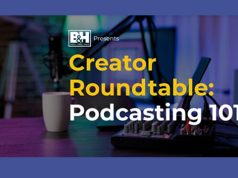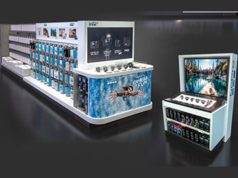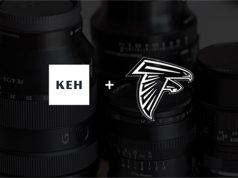
Someone once called it “counter intelligence”—using your time with the customer to not only make the sale of exactly the right camera, lens, flash, tripod, whatever, but also to plant the seeds of the next visit and the ones after that. Aiding the process are print clubs, special offers, coupons, classes, photo treks, you-name-it.
Repeat-customer prospecting is more important than ever, because—as one of the retailers I spoke with pointed out at the start of our conversation—there are few doors anyone has to walk through these days. Point, click, answer the doorbell.
For the retailers I spoke with, the time-tested methods of friendly persuasion and relationship building are still on the job, as is the day-to-day delivery of the message that’s the cornerstone of the business: this is the place for outstanding service.
Roger Christian
University Camera, Iowa City, Iowa
What we try to do is make a connection with the customer as best we can in the time we’re given. We always do suggestive selling. We know we’re not going to sell X, Y and Z today, but we always plant the thought, and that brings a lot of people back. But what does better than anything I know, and better than anything we’ve done, is . . . look, I’m at a party and I’m talking to somebody, and he says, “I was in your store and so-and-so took care of me, and it was just great.” And that’s the thing we do that brings people back: we provide the best service on the face of the planet.
It’s the relationship at the counter that starts the process?
It’s more than that. I’m going to give you an example. Here’s what someone posted on LinkedIn about us: “I live in Illinois . . . still go back to University Camera in Iowa to buy my camera equipment from Roger. Not only does he inform me and teach me about the gear I purchase, [but] one time I was having trouble technically on location with a new purchase, so I called Roger, thinking he’d walk me through it over the phone. He is so dedicated, he drove out to my location and assisted me. . . . this is only one instance of how incredible he’s been.” I hate to tell you because it sounds terribly egotistical, but I hear this all the time about everything we do.
So, given that everybody sells basically the same products and offers the same services, the difference is really personnel, and that’s the factor that brings people back into your shop?
That’s correct. And, truthfully, part of it is that some stores in the area and other places I’ve heard of simply don’t provide that level of service or even interest. People walk in and I’m talking with them the whole time, drawing them out, and this is where most [salespeople] fail. I get information because I ask the questions. That gives me a lead into what they’re doing, and I can carry the whole thing further. I don’t care what they came in for. I know that eventually they’re going to need something—filters, a flash, lenses, a tripod. Because they don’t have it, they’ll probably need it.
And you want to learn about what they’re doing.
Exactly. I’m not worried about asking questions. I look at it as information gathering. And if they don’t want to tell me, they won’t.
Mike Wilbur
Mike Crivello’s Camera, Brookfield, Wisconsin
I don’t have a regular schedule of things, like a person who buys a DSLR camera in six weeks is going to get an e-mail from us saying that he can get a deal on a big print, but we send out promotions on photofinishing specials on large prints, for 11×17 and larger.
You’re thinking that people who buy DSLRs will be customers for prints?
What we try to do is put the thought in their heads that they’ve got these nice cameras and we’re sure they’re taking some wonderful pictures. So why should they go to the local “starving artist” show and spend 40 bucks on some painting to hang over their living room sofas when they probably have better pictures [they took themselves]—and we can print those pictures on canvas, and they’ll have something they did that they can hang on their walls.
Do you offer classes to your customers?
We do run classes, and we send out e-mail to customers informing them about the general photography classes geared toward the DSLR user, and we especially promote the specialty classes, like sports photography, that use higher end lenses. And we’ll have manufacturer-sponsored events that are geared a little more toward lighting and studio photography [subjects]. We run those a number of times over the course of a year, and we do send out promotions to our customers to get them back into the store.
Scott Farber
Hunt’s Photo & Video, Melrose, Massachusetts
We don’t necessarily go out and contact a specific customer to bring him back into the store after we’ve made a sale, but much of what we do in advertising is based around having people think about us when they think about photography.
We do a lot of classes, but the point of the classes isn’t specifically about getting them back in the store. It’s about fostering their interest in photography. We believe that if people are using their cameras on a regular basis, and becoming hobbyists, they’re going to come back and shop with us. So getting them to be better photographers is a crucial thing. Our advertising is all based on that, and we are constantly in front of our customers through newspapers, radio, TV, billboards, the Internet, so when they think of photography, they come back to us.
Is there anything that a salesperson will do at the counter as a result of selling, for instance, a sophisticated DSLR?
What we do after a sale is the salesperson writes a thank-you note to the customer and lets him know if he has any questions about the camera, or anything he needs, he should contact us. And we offer a lot of services, like camera checks and sensor cleanings.
But you find classes especially effective?
I was just talking to some of our folks here about how I’m noticing when I’m out socially and people ask me what I do, and I tell them, the number one thing they say is, “Oh, I’ve got to get over there for a class.” I’ve noticed it more and more now, and I think that classes have become one of the things people want but don’t always take. They need some sort of kick in the butt to go, so this Christmas season we’re going to change a lot of our focus and base it around the idea, “Come in for education.” We’ve always had a big sign out front mentioning some of the print services we do here, and we actually just changed it to talk about classes, to get people motivated to come back to take a class.
Are these advanced classes mostly?
No, not really. We do a lot of webinars and seminars on advanced topics—we tend to find people who follow us on Facebook or who read our e-mails tend to be that higher level customer, the enthusiast—but our classes’ marketing speaks more to the entry-level customer.
Bruce Muhlbradt
F-11 Photographic, Bozeman, Montana
We offer a book with a lot of different coupons for the lab and for hard goods, and we also sign [customers] up for a membership in our photo-imaging club, which basically gets them an account on our photo-ordering site and gets them free prints. And we e-mail them monthly specials from our lab.
All this is done when you make the sale?
Yes. We’ll use some of the coupons as enticements. The coupons are toward prints and also equipment; we do 10% off filters and 20% off one Lowepro bag—those are probably the most popular ones. And there’s another coupon for batteries.
Are these offers for all equipment sold?
No, just for cameras, but we do them for point-and-shoot models as well as for DSLRs.
So you see a connection between people buying point-and-shoot cameras and wanting prints?
We do. We have a full professional lab, which I know brings in the largest percentage of our income. We’re doing very well with it, and we’re very on top of it as far as bringing in new products. We recently started with metal prints, and we offer all sorts of mounting options. We’ll put a photo on just about everything you can imagine—mugs, tiles, canvas, books, jewelry—so we’re being very creative with our lab.
And these picture services and products are part of what’s in the coupon book or offered in e-mail promotions?
Yes.
Classes for buyers as well?
We do quite a few. In summertime we do workshops, and throughout what you might call the school year we do a lot of normal classes—both photography and, because we’re also an Apple reseller, a lot of “getting to know your iPad” sort of thing as well. And recently we hosted a book signing with David Muench. We seem to get involved in all sorts of things.
Tom Gramegna
Bergen County Camera, Westwood, New Jersey
My view on retention and repeat business is that no one now needs to walk into any store; everything can be at your doorstep the next day. So in order to produce the customer who wants to come in and then wants to repeat, we must deliver an extraordinary experience.
And part of the experience might be…?
We do coupons, local photo trips, free Saturday morning classes . . .
Free?
Yes, starting at 9:30 every Saturday morning. We call them focus sessions; we have 20 to 40 people for a half hour or an hour. We offer the classes regardless of the product they bought. It’s general photography, educational in nature, but with a little bit of a hook about making a purchase if they’re motivated by what they’ve learned. It’s a soft sell, but people are more inclined to buy if they feel there’s a teaching component going on. And we send a thank-you card, handwritten by the salesperson, to every person who buys a serial-numbered product from us. No offer, just a pure thank you for doing business with us. We feel that helps to cement relationships.
If you want their continued interest, you have to demonstrate your continued interest.
We try to engage them at every opportunity. We promote our trips in e-mail newsletters [but] e-mailing people is maybe 10 or 15% successful; everybody is pressed for time, so we must engage where they are, and for us we find that Facebook serves to get the conversations growing. And if I can throw this in: it also helps to be part of PRO, where we have the Best Practices in front of us.
Because PRO stresses the educational aspect and relationship building with customers?
Absolutely. We must make the customer feel special for walking through our door. That’s the future of our business.





